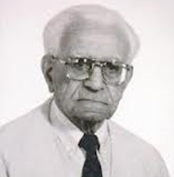János Sebestyén
After graduating from university, he was an engineer and constructor at the United Machine and Metal Products Works in Budapest, and from 1945 he was the deputy head of the Substations Department at the Budapest Electric Works.
From 1948 he was the head of the Heavy Industry Center. In 1949 he was entrusted with the management of the Heavy Industry Investment Company, and through this he became responsible for the investment in the Dunapentele (then Sztálin) Iron Works (later known as the Dunai Vasmű) and the town built next to it – eventually as a government commissioner. From 1953 he was the first CEO of the Sztálin Iron Works Trust.
From the beginning of 1954, as Deputy Minister of Heavy Industry, he established order in the reliable operation of the country's unstable electric network in a very short time.
Between 1957 and 1960 he was the head of the Hungarian Foreign Trade Office in Frankfurt am Main. Having studied the structure and mechanisms of the industrial policy of the successful West German economy, from 1960 he and Árpád Kiss prepared the establishment of the National Technical Development Committee (OMFB). This workshop was a pioneer of Hungarian economic and social renewal; the establishment of the Hungarian computer industry also started from the OMFB. From 1961 to 1988 he was the vice-president of the OMFB, from 1970 its general vice-president, and after his retirement in 1988 its presidential advisor.
He was a defining industrial politician of the second half of the 20th century. He was the director of the Computer Science Development Program (SZKFP), developed between 1967 and 1969, including the Computer Science Research Target Program (SZKCP). The SZKFP helped to establish the industrial base and research institute network of computer science, laid the foundation for computer science education, and facilitated computer science trade.
From 1969, he headed the Hungarian side of the Intergovernmental Committee on Computer Technology, which was organized to implement the Unified Computer System (ESZR) program. To assist in this work, he established the Interdepartmental Committee on Computer Technology, which he also headed. In 1969, he founded the Computer Technology Coordination Institute (SZKI). Through his influence, the opportunity to purchase computer technology licenses was created, including by creating the necessary stock of goods for barter. He managed the bilateral relations with the French government and SIEMENS in this context. He contributed significantly to the creation of the Hungarian IT network infrastructure and the microelectronics industry.
His awards: Kossuth Prize (1954); the Order of Merit of the Red Banner of Labor (1954, 1971); State Prize (shared with Zsolt Náray and István Papp, 1984); Neumann Prize (NJSZT, 1988); Hero of Socialist Labor (1988).
Created: 2016.05.16. 13:35
Last modified: 2024.03.24. 12:07

